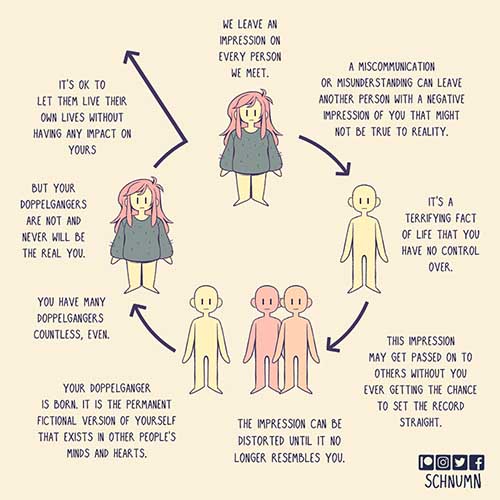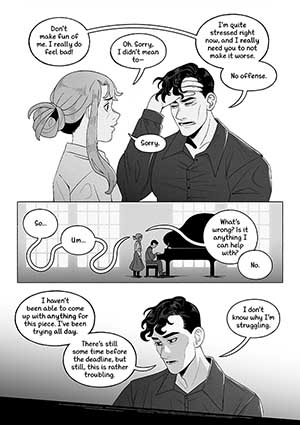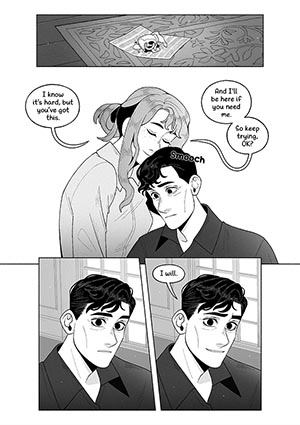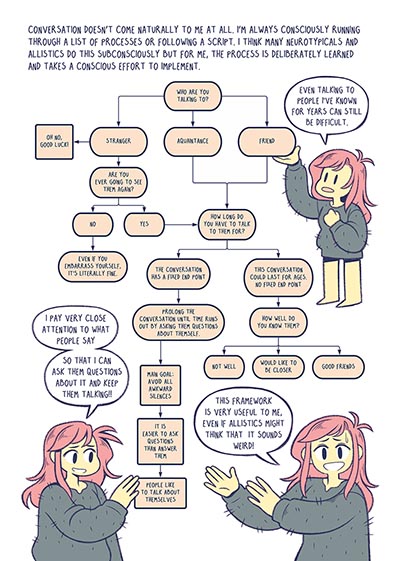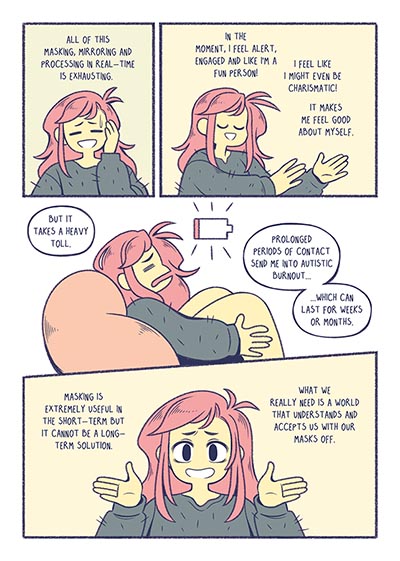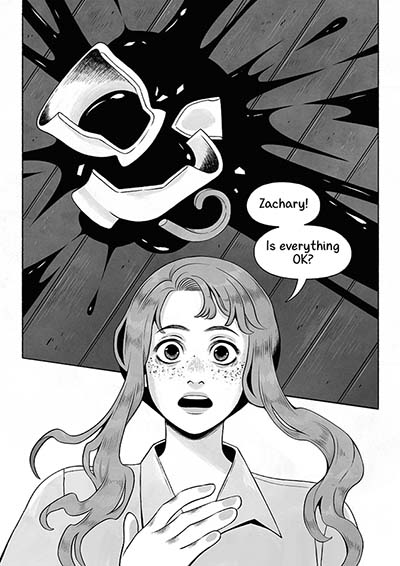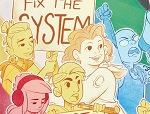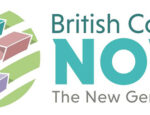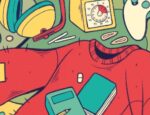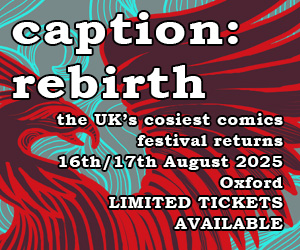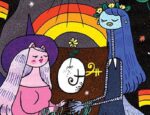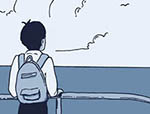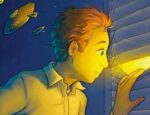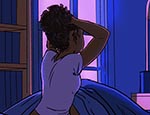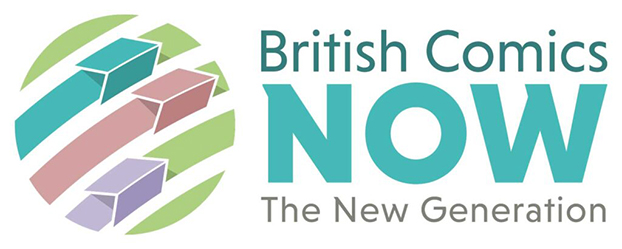
BRITISH COMICS NOW! As mentioned at Broken Frontier earlier this year six British/UK-based comic creators will be attending this year’s Toronto Comic Art Festival (TCAF) as part of the British Comics Now initiative from the Lakes International Comic Art Festival (LICAF), and funded by Arts Council England, The Adlard Foundation and The British Council. To mark this at BF we’ll be looking to shine some spotlights on the practice of the six artists involved. Next up on the list is Bex Ollerton, aka Schnumn, the driving force behind the Broken Frontier Award-winning anthology Sensory: Life on the Spectrum. We chat with Ollerton today about sharing neurodivergent experiences through comics, creative process, and the possible vulnerability of autobio work…
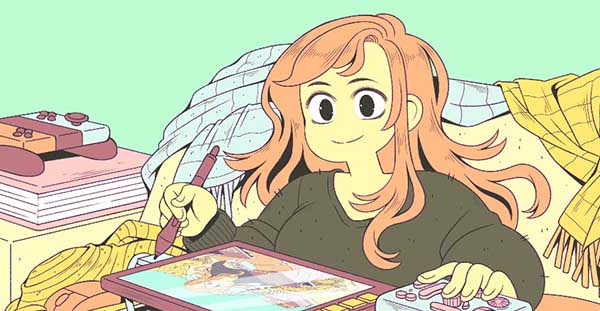
ANDY OLIVER: You describe your practice as being “about mental health, neurodivergence and the general struggles of being a human being in an overwhelming world.” What is it about comics that makes it such an empathetic medium for you in exploring those themes?
BEX OLLERTON: I’m not really sure why this is, but in my experience, people seem to find it easier to relate to a cartoon avatar than an actual human person. What I mean is, like, if I try to talk to someone about mental health issues or neurodivergence, they seem to be sympathetic without really getting it, but if I make a comic, people are more able to empathise with what I’m trying to communicate. I think this is because comics have the power to force a reader into the shoes of the narrator, you can really bring someone with you on your journey instead of just telling them about it. I think people find it easier to digest something that feels a bit like a story with a narrative whereas life kind of doesn’t really have a narrative.
I also just really like that comics are an accessible blend of images and words, so you have two really powerful tools at your disposal that work in tandem to communicate what you’re trying to say. Sometimes, I can’t find the right images, so I rely on words, and sometimes it’s the other way around. You can say a lot with images and framing, and I think that’s really neat! Humans are complicated creatures, and being alive for the very first time is hard, and I think that seeing a little cartoon person having the same struggles as you can help you to feel seen.
Another aspect of why I love comics for communicating these ideas is that you can condense powerful and meaningful ideas down into bite-sized chunks. You can share a comic with your friend and be like “this is what I was trying to say!” or even take it to your therapist and tell them, “this is what I was struggling with!” and I really believe that comics have the power to make things just click for people. Comics are awesome!
AO: Lavender Clouds is your online series of autobiographical comics shorts that examines neurodivergence and mental health. How cathartic is it to address these issues on the comics page? Is there also a sense of vulnerability to it?
OLLERTON: For me, it’s extremely cathartic to make these kinds of comics. I used to struggle with the vulnerability a lot more than I do now. I think for me, the biggest takeaway from making Lavender Clouds is that I’m just not afraid of that kind of vulnerability anymore, and I bring that into every aspect of my life. Being real about where I’m at and what I’m feeling, and sharing it with an audience has made it a lot easier for me to just be more real in my day-to-day life, and that willingness to be vulnerable has helped me to deepen my existing relationships, make new friends, be able to be present and there for people without it feeling awkward or weird; I think the ability to be vulnerable is kind of a skill, and I’ve trained it through comics!
The reason I started making Lavender Clouds in its very first form all those years ago was because I wasn’t comfortable with vulnerability: I was in a very bad place mentally having just dropped out of university for the final time, and I was really struggling with undiagnosed AuDHD, trauma, and depression. The people in my life were very worried about me, but I didn’t want to talk to anyone about anything that was going on with me. Making comics and posting them online was my way of being like “hey, here’s what’s going on with me! I don’t want to talk about it, but this is my way of letting you know!” and that was really good for me for a while. This was before I really had any kind of an audience so it was like, OK, I’m posting a comic, and my friends have liked the post, nice! Desired outcome achieved!
I wasn’t really prepared for an audience or for other people to relate to my work and even say that it had helped them. At first, I wasn’t mega comfortable with it, but I’m really grateful for that now and it brings me a lot of happiness. I’m glad that a project I started for myself has grown beyond just me. I will always make comics for myself, because I think that’s important for an artist, but I hope that people can continue to get something out of my work.
I should also probably put my business hat on here and say that the print version of Lavender Clouds is coming out this June!
AO: There are pages from your graphic-novel-in-progress Violapse (below) on your site where you adopt a very different art style; one that is both haunting and intense. Can you tell us a little about the premise of that project?
TW: Domestic violence
OLLERTON: Violapse is my passion project that I’ve been chipping away at for many years. It’s a thriller graphic novel about domestic violence, based heavily on my own lived experiences with intimate partner violence, but fictionalised. I’ve spent kind of an embarrassing amount of time writing it, because there’s so much that I want to say with this project, and it means so much to me, but I’m confident in how it’s shaping up and I can’t wait to eventually be able to share it with the world. I think that this will be my most important work.
The story is about Melody, a young woman who tries to help her partner achieve his artistic vision, but when his frustration with his own shortcomings leads him to abuse her, she must face the resentment and anger that she’s been denying in order to appease her partner and use it to save herself before it’s too late.
Violapse aims to shine a spotlight on the reality of life in an abusive home. It is a story written with care for survivors as it hopes to demonstrate how escaping a dangerous situation is difficult when violence has become the new normal. Ultimately hopeful, Violapse is both an indictment and celebration of anger.
AO: A few years back you were the driving force behind the acclaimed (and Broken Frontier Award-winning) anthology Sensory: Life on the Spectrum in which over 40 creators depicted their experiences with neurodiversity. From its initial origins as a Twitter hashtag through to it being picked up by publisher Andrews McMeel what were the challenges logistically in overseeing a project like that?
OLLERTON: Sensory was a huge undertaking; I learned so much from that project! I was initially inspired by Pina Varnel (ADHD Alien) who ran a similar comic event for ADHD in October of the previous year. I was fortunate enough to have helped a small amount on that project, and back then I was inspired to do something similar for autism.
Everything was done kind of last-minute (the neurodivergent readers will know how it is) but in March, I put out a tweet asking if there were any autistic comic artists around who wanted to collaborate for April, and the response was so much greater than I’d thought it would be! It turns out that there are a whole bunch of autistic comic artists, which is awesome!
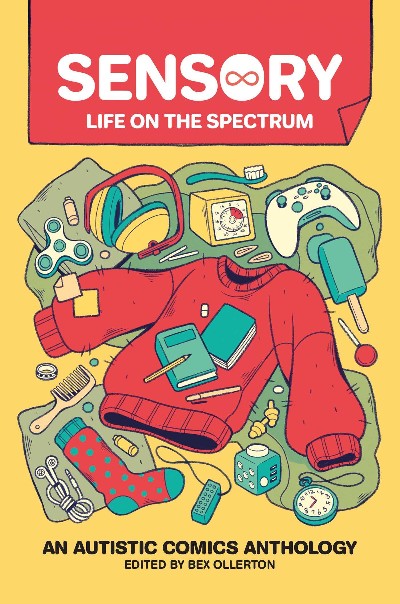
From there, I shoved everyone into a Discord server and we began making comics at lightning speed. I drew up schedules, assigned deadline groups, and spent over a month editing, lettering, giving feedback, organising… it was a lot, and I didn’t get much of a break, but I was so passionate about the project and so was everyone I was working with so it was a really cool time! I remember it very fondly.
At some point after we started posting the comics, I just kind of had the thought that was like, “hmm, we have a lot of comic pages… why don’t we make a book?” So, in the span of about a week and a half, I’d put together a Kickstarter campaign and we were ready to go.
The Kickstarter campaign was an overwhelming success. We managed to raise over £45,000 to make our book. What started out as a fun little social media project became something where I was able to actually pay autistic creators fairly for their work, which was and continues to be hugely important to me.
I fulfilled the Kickstarter myself with the help of my parents and my partner. It was really hard, to be honest, but it was a lot of fun too. I was kind of riding the high of the project to get this thing delivered, but we ran into some difficulties with shipping and by the time the project was fulfilled, I realised that I was deeply burned out. That burnout would last two whole years and it’s been really hard to claw my way back from it, I think that ultimately it was just too much for me to organise, also participate in, fulfil, publish, and be the sole person responsible for a project like that. Or maybe it was just that I was too inexperienced for such a lofty goal back then. I don’t regret doing it, it’s one of the best things I’ve ever done, but I would definitely do it differently if I could do it again. It’s complicated to look back on that time because the whole process had a very real negative effect on me, but I also remember it very fondly and it was a lot of fun and I’m so happy I did it.
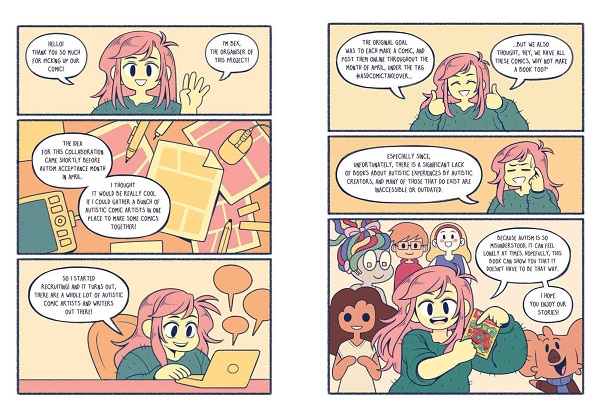 We managed to sign a book deal for the Sensory anthology, and it went on to be nominated for an Eisner Award, as well as winning the Broken Frontier Best Anthology award, and it’s also been nominated for both a Ringo! Award and a GMIC award. It’s been extremely cool to have been involved in a project that has meant a lot to people, and it’s meant a lot to me too! I’m really glad we managed to do it, and I’m so thankful for having such solid people working alongside me, most of whom I am still in touch with to this day.
We managed to sign a book deal for the Sensory anthology, and it went on to be nominated for an Eisner Award, as well as winning the Broken Frontier Best Anthology award, and it’s also been nominated for both a Ringo! Award and a GMIC award. It’s been extremely cool to have been involved in a project that has meant a lot to people, and it’s meant a lot to me too! I’m really glad we managed to do it, and I’m so thankful for having such solid people working alongside me, most of whom I am still in touch with to this day.
AO: What were some of the most rewarding reactions to Sensory as it reached wider audiences?
OLLERTON: Oh man, the reaction has been immense from start to finish. People were so positive about the comics when we were posting them online, and then people were so unbelievably supportive of the Kickstarter. The people I worked with at Andrews McMeel and my agent Tara Gilbert were so excited and enthusiastic about the book the entire time, and my collaborators in the anthology were a beam of bright light throughout.
But in terms of a wider audience, the continued response to Sensory has been so… it’s actually kind of hard to find the words, but just really positive and I can tell it means a lot to people. I get emails about it constantly, people want to talk to me at conventions about it… I hear stories from people telling me that the anthology helped them to realise they’re autistic and that it’s had a significant impact on their lives, which is nuts honestly, but it’s also kind of what we set out to do.
What I really wanted to achieve with Sensory was
- To provide accessible and fun information about autism in a way that centres autistic voices and a neurodivergent audience.
- To be able to reach people who might be looking for that answer as to why they’ve always felt different, and give them something that can help them on their journey.
- To improve the lives of autistic people in any small way.
And from the stories I’ve been told, I think we managed to achieve those goals. I’ve had multiple people cry in my arms while telling me that they might not be here without Sensory. I’ve heard from teenagers that Sensory has helped them get the support that they need, I’ve heard from parents who were thankful for information that was non-pathologised and helpful, who have realised through Sensory that their child isn’t the only autistic person in the family. I’ve heard from adults that they have used Sensory to better communicate their struggles to partners, therapists and employers. I’ve heard from teachers that Sensory has helped kids in their class, or help other teachers to understand their neurodivergent pupils… It’s been a lot, but in the best way.
AO: Next up, the inevitable process question which we’ve been asking all our British Comics Now interviewees. Can you give us some insights into your creative process and the mediums you work in? Does that ever differ depending on the project you might currently be working on?
OLLERTON: Oh, I love to talk process! I mostly draw on my iPad these days in Procreate, but I also draw on a Wacom Cintiq in Photoshop – Photoshop still has a lot of features that Procreate doesn’t have, but I also wish that they would cut it out with their business practices… the recent jump into generative AI is making me consider swapping full-time to Clip Studio Paint – and I also really like to use Clip Studio Paint’s 3D model feature, which is super cool and I highly recommend it. So, the short answer is, when I’m just sketching out ideas, it’s usually in Procreate, but if it’s something more robust, I switch a lot between Procreate, Photoshop and CSP, often for the same drawing or comic page.
My process is pretty different depending on what I’m working on. One of the things I’m slightly nervous about with regards to Violapse, is that it’s drawn in a totally different style to what people are used to seeing from me. The kind of chibi bean-like style that Lavender Clouds is drawn in is not actually how I draw most of the time, but it’s the only kind of art people usually see from me. I really enjoy working in that style, and doing it for so long has taught me a lot about cartooning, appeal and simplification, but I also like doing more robust stuff.
I really pride myself on my line art, it’s one of my favourite parts of the process! And I kind of hate colouring… which might seem strange because one of the most common compliments I receive for my artwork is that people like my colouring! My approach to colouring is to go all-in on picking a nice colour palette, because I hate shading!!! I’m a bad artist who doesn’t understand how lighting works! But I’m trying!
My favourite thing is actually to work in black and white, though. I think greyscale really gives line art the chance to shine, and I’m really looking forward to that with Violapse (more below). I can’t wait for people to see it, I hope they like it!
AO: What excites you the most about being part of the British Comics Now delegation to TCAF?
OLLERTON: Oh geez, I mean firstly that it’s just such an honour to be chosen for this. I don’t think of myself as being someone who’s super talented or deserving so to be thought of at all, let alone selected, is a huge deal to me personally and I’m very grateful.
Secondly, I love TCAF!!! I was lucky enough to be able to go for the first time in 2022 and I had the best time ever, it’s such an awesome show that has comics at its core and everyone there was so fun and friendly. That week I spent in Toronto was one of the best times of my life and I look forward to being able to go back there!
As we see comic conventions move further away from comics, I really relish the chance to be able to go to an event like this. I’m going to buy so many comics… And I hope people come and look at our stuff, too! UK comics has SO much to offer and I think we’re going to be putting on a really awesome spread of work. Small-press and indie British comic artists don’t tend to make it overseas so I think this is a really incredible initiative to show the world that we are here, and that we’ve got some cool stuff going on!
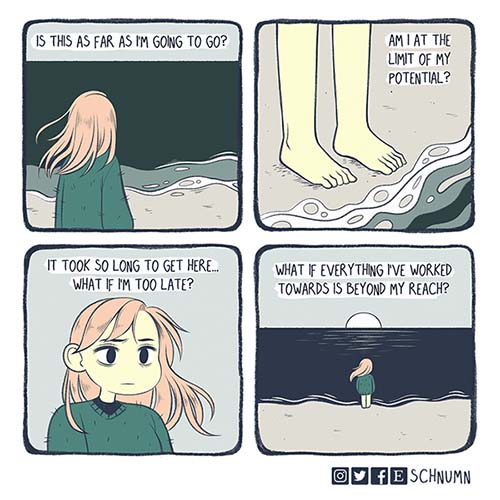
From short comic ‘Staying Afloat’
I’m really excited to get to hang out with the other artists involved in this, I’m familiar with most of their work but it’ll be really cool to get to chat and hang out, I can’t wait! I’ve also arranged to meet my editor from Andrews McMeel for the first time in-person at TCAF, which is very cool for me personally!
AO: And, finally, what else are you currently working on? Any teases you can give us for upcoming creative endeavours?
OLLERTON: I’m working on three things right now!
Firstly, I’m working on a fantasy catgirl comic written by Richard Bass and edited and illustrated by myself, called Nyaegling. It will be coming to Kickstarter at the end of May if everything goes according to plan!
I’m also working on Violapse, which I’m pitching right now. I really hope it gets picked up but if not, I’ll just make it on my own! It’s deeply important to me so even if it takes a while, one way or another, it will be done.
And lastly, I’m actually sat on a huge pile of comics about autism from 2022 and 2023 that I’m trying to turn into a sequel to Sensory. These comics are really excellent, we tried to be more specific with our comics since Sensory, directly addressing misconceptions about autism, and I hope that we can bring these to the world soon!
Visit Bex Ollerton’s website here
Interview by Andy Oliver






